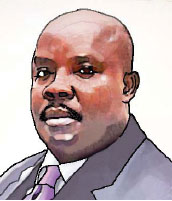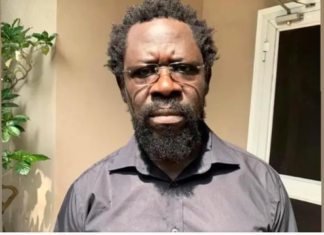with Emeka Alex Duru
Ijele, a phenomenal masquerade in the Anambra/Enugu axis of Igboland, is not the type that performs at ordinary times. Among its followers and spectators, Ijele is held as a spirit; a link between the living and the dead. This is why its appearance at the village square is often celebrated. It is also, in a way, ominous.
To some extent, former Lagos State governor and national leader of All Progressives Congress (APC), Senator Ahmed Bola Tinubu, fits into the Ijele category of Nigerian politics. A man of means and large followership, Tinubu falls into proper definition of a politician.
Endowed with rare combination of benevolence and shrewdness, Asiwaju Yorubaland, in going into any encounter, knows when to advance and retreat. Borrowing from the words of the boxing legend, Muhammad Ali, he can rightly be said to know when to dance like a butterfly and when to sting like a bee. But he is not given to frivolities.
Thus, when the former governor took on the Minister of State (Petroleum), Ibe Kachikwu, recently, over his slip on the ravaging fuel crisis and why Nigerians should not expect magic from him, the intervention readily earned him applause across the land.
He had challenged the Minister on his cocky posture, stressing that it was not in line with the philosophy of the party. By that action, Tinubu appeared to be on the side of the people and clearly stole the show.
Of course, being among the eggheads that cobbled the divergent tendencies that later emerged as APC, it should be taken that Tinubu knows what the party stands for on any issue. But acting the politician in him, Asiwaju, apparently riding on the euphoria of the moment, went an extra length in trying to explain the cause of the fuel crisis, blaming it on the failure of the Peoples Democratic Party (PDP), to fix the nation in its 16 years of administration.
According to him, if PDP had done what it was supposed to do, Nigeria would not be in its current pathetic situation.
That seemed to be the tonic President Muhammadu Buhari needed to return to his familiar terrain of blaming the ills of the country on the former ruling party. Other high officials of APC have taken a cue from the two, ever since.
But that is hardly what Nigerians need at the moment, though it curiously seems to have remained APC’s staying power, especially in parrying even the most minimal in challenges of governance.
Until the party’s victory in the 2015 general elections, it had sold the dummy of a know-all government-in-waiting organisation. Cashing in on the regular flip-flops of the then PDP government, APC had hoodwinked Nigerians into believing that it had solution to the country’s myriad problems.
But with victory and power on its laps, the party has not left even its supporters in doubt that it is hardly prepared for governance. From its incoherent attempts at policy formulation to poor execution, the ruling party has demonstrated that its premium and possibly, only agenda, was to grab power at the centre and as many states as it could.
Given the convergence of otherwise strange bedfellows that coalesced into the party at formation, it may be easy to understand why many of its foot soldiers may not really be at home with some of its policy blueprints.
But that cannot be an excuse for a leader in the mould of Tinubu, the acclaimed Lion of Bourdillon. Given his enormous experience in human and material resource management, buck-passing in the face of problems is not an attribute that he could be associated with. For a man that successfully galvanised the opposition in the face of daunting challenges up to the point of upstaging a ruling party for the first time in Nigeria’s history, blaming a largely-discredited PDP for the problems of the country nearly one year of his party being on the driver’s seat, simply, begs the question.
Unless Asiwaju and his fellow chieftains of APC could have been angling for the so-called national cake which they may not have readily located, their immediate task as the moral beacons of the party should be to put on their thinking caps in steering the nation out of its current valley of hopelessness.
Leaders make their marks and earn their reputations in moments of uncertainty. Dr. Michael Iheonukara (M.I.) Okpara, Premier of the defunct Eastern Region, did not meet a robust economy in his constituency before elevating it to fourth largest growing economy in the British Commonwealth within four years. It was rather by dint of hardwork and committed leadership.
Obafemi Awolowo, who was in charge of the Western Region at the time, did not blame the British colonial masters for the ills of his people before repositioning the area. In similar way, Ahmadu Bello was essentially spurred by the challenge of the North in offering his people pragmatic leadership instead of advertising the obstacles he met on the ground as excuses for non-performance.
Tinubu and his APC colleagues may therefore be reminded of their demand on the people, while campaigning, which was to give them their votes, with a pledge to fix Nigeria, if elected.
In obedience, the Nigerian electorate heeded their call and gave them their mandate. It, thus, behoves the party and its leadership to fulfil their side of the bargain. Nigerians are not asking for magic from them; they only need evidences of sincerity and action on the part of the party.
That, incidentally, has not been the case. APC and its officials have rather fed the people with propaganda and cocktail of lies, in a manner suggestive of an organisation that is not in a hurry to leave the domain of opposition for a ruling party role. This is the problem Nigerians are facing.
It will, therefore, be grossly unfair on the part of Tinubu and APC leadership to further this obvious inaction by passing the buck of their inadequacies on the failings of a PDP government that Nigerians voted out of power since March last year.












